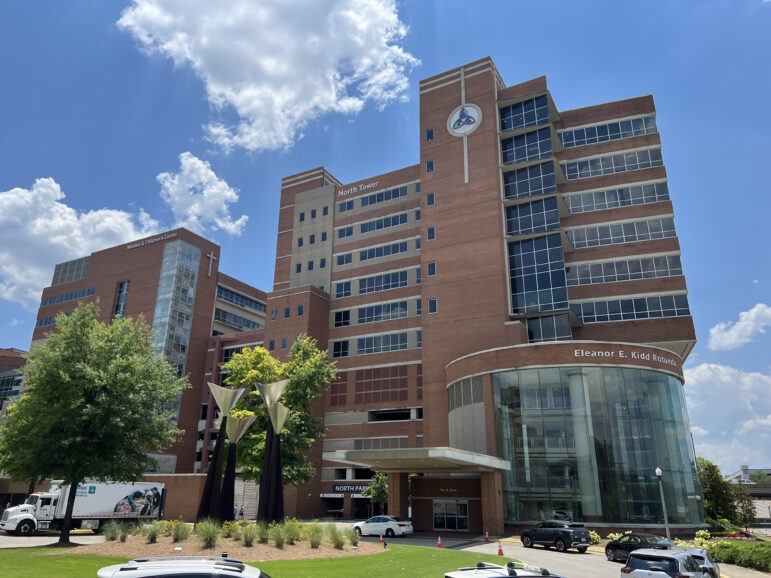It’s nothing if not consequential. For starters, the University of Alabama at Birmingham’s acquisition of Ascension/ St. Vincent’s operations and properties in Central Alabama is valued at $450 million.
If something were to go south with this half-billion-dollar deal, the ramifications would impact not just the Birmingham area, but the entire state. After all, UAB is the state’s largest public employer, operating Alabama’s largest hospital, with other health care facilities, such as Kirklin Clinic and Callahan Eye Foundation Hospital, serving a huge swath of the state.
Ascension, itself, clocks in with the state’s 11th and 14th largest hospitals – Ascension/ St. Vincent’s Birmingham and East, respectively – as well as three other area hospitals and a rehabilitation and fitness center.
Third-party efforts to analyze the acquisition are still in the early stages. However, questions are being asked about the implications for health care customers in Central Alabama, as well as employees of UAB and Ascension.
Economist Elena Andreyeva teaches health policy and management at Texas A&M. She cites a soon to be published study that shows bigger health systems often lead to increased health care costs, in part, because they have fewer competitors.
“Anytime a larger hospital acquires either an independent hospital, or portions of a system, prices increase,” Andreyeva said. “On the conservative side, they might be increasing by five to six percent.”
She said labor costs are typically about 50% of a hospital’s operating budget, and the data shows acquisitions or mergers can lead to layoffs to reduce redundancies, specifically in administrative positions.
“Once you cut down on some of these back-office personnel by aggregating it to the main system, you can reduce your labor costs,” Andreyeva said.
Benjamin Ukert, like Andreyeva, is an economist and health policy professor at Texas A&M. He also worked on the study cited by Andreyeva and said health care costs often increase after acquisitions.
“If you have a regular hospital stay, you’re more likely to pay more … as the market becomes more concentrated,” Ukert said.
Andreyeva and Ukert are not familiar with UAB or Ascension’s finances. The findings in the paper come from a study of health systems in 20 states.
Generally, price bumps can have a cascading effect, Ukert said.
“In the near future, maybe those higher prices translate to higher health insurance premiums,” he said. “Employers also pay a large share of the premium, so this could mean that their cost of doing business increases over time.”
In response to these claims, UAB officials said they do not anticipate increased costs.
“Our intent is to sustain patients’ access to quality healthcare, and we do not anticipate increased costs,” they wrote in a statement. “In fact, we anticipate that we will be able to achieve economies of scale to – ultimately – reduce the cost of care.”
As for cuts in staff, UAB officials said they want to avoid layoffs.
“We hope that most, if not all, St. Vincent’s roughly 5,000 caregivers and associates will continue in their current role,” UAB officials said. “Employee benefits are anticipated to be comparable to those they currently have, and associates and caregivers will not receive less in base wages or salary.”
Andreyeva said it’s typical to see officials make such promises.
“I am not saying that they are outright being dishonest … but depending on what financial position they currently are in, they might end up having to cut some costs somewhere,” she said.
Andreyeva said those cuts, in turn, could positively impact consumer pricing.
“That could be another avenue to save costs, by maximizing your efficiency, and economies of scale,” she said.
Dr. Don Williamson, president of the Alabama Hospital Association, sees UAB’s acquisition of St. Vincent’s properties as a big plus for Birmingham and the surrounding region.
“I think from everything we know at this point, this is nothing but a positive in terms of stabilizing access to care and the health care system in central Alabama,” Williamson said.
He notes St. Louis-based Ascension has seen multiple years of operating losses. According to Becker’s Hospital Review, an industry publication, those losses totaled roughly $3 billion in 2023, alone.
Those kinds of deficits have forced Ascension, which had included almost 140 hospitals, to begin selling some of its properties throughout the eastern U.S. They had previously signaled they would sell their operations in Central Alabama.
The UAB acquisition was what Williamson calls a rational move, since UAB and Ascension had been partnering to provide care in Central Alabama for about four years.
“This is simply an evolution of the partnership,” he said. “Since Ascension was going to leave the state anyway, it’s critically important to maintain that infrastructure.”
Williamson said he has not seen the financials behind the purchase and what it will take to keep the hospitals in the black. But without the acquisition, he said the Ascension hospitals could’ve eventually closed.
“What this merger does is it brings an Alabama partner into the situation that is committed to keeping your hospital open,” Williamson said.
The acquisition must still be approved by regulators and the Catholic Church, which owns Ascension/ St. Vincent’s.
Editor’s note: UAB holds WBHM’s broadcast license, but our news and business departments operate independently.

